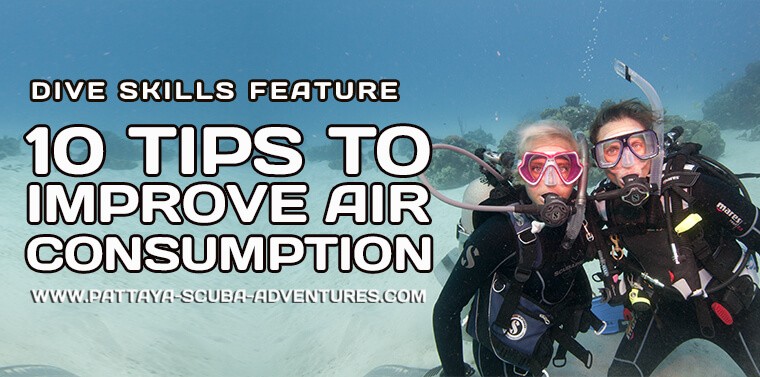‘How much air do you have left?’ is probably the number one question most of us dread after a dive. Every diver can benefit from Tips to Improve Air Consumption. It’s when you find yourself glancing at your dive buddy’s air or even your instructors, then wondering how they’ve managed to come back with so much! Whilst a lot of it is down to experience, there are ways to help improve air consumption when scuba diving and have you feeling a little bit better when you’re next asked about how much air you have left. [/vc_column_text][vc_row_inner][vc_column_inner offset=”vc_col-lg-6 vc_col-md-12″][vc_column_text]
Tip #1
Master Buoyancy Control
Constantly fighting with your buoyancy control underwater is not only stressful and dangerous to marine life but it definitely cuts into your air supply too. Mastering neutral buoyancy is the most important skill a diver can have, why not get this one down pat by taking the PADI Peak Performance Buoyancy Course?
Tip #2
Fitness
Keeping regularly active and on top of your fitness is key in improving your intake of air. It means carrying around less weight and being less likely to be short of breath. If it’s a struggle for you to breathe properly with all your gear on the outside of the water then imagine what you’ll be like underneath it!
Tip #3
Well-fitted Equipment
Believe it or not, having ill-fitting gear can impact our air consumption, whether it be uncomfortable or restrictive in any way. Always make sure your equipment fits you properly, this will ensure your dive equipment is creating unnecessary drag resulting in being less efficient and streamlined whilst diving.
Tip #4
Correct Weighting
This is a big one. A lot of divers tend to overweight themselves as an extra precaution, or go the other way and underweight themselves, but it’s far more beneficial to figure out what weight you need and how to distribute it. Try moving the weights around and switching between a belt and an integrated one, figure out what works best for you and stick with that. Perfecting your weight one day whilst wearing a thick wetsuit may be different to the next when only in a rash vest, decide what’s best for you and you’ll be saving air in no time.
Tip #5
Don’t Hold Your Breath
The number one rule in diving is to never hold your breath! Not only is this a safety rule but holding your breath underwater will not prolong your dive, it’ll only increase the carbon dioxide concentration in your lungs and make you feel starved for air.
Tip #6
Reduce Equipment
Are you carrying around accessories that you don’t need? Focus on being streamlined and try to reduce the bulk of your equipment. It’s well worth configuring your kit too to help you dive the best that you possibly can.
Tip #7
Don’t Use Hands
Experienced divers never use their hands. It’s not just the fact that they don’t need to after mastering their buoyancy but it also conserves their energy. Flapping your hands and arms about underwater is only going to drain your energy faster whilst also draining your air supply.
Tip #8
Appropriate Equipment
Think about the environment you’re in before you start getting ready. What’s the water temperature? Are you likely to be warm or cold? Is current to be expected? Make an informed decision and choose between closed or open fins and thick or thin wetsuits etc. This all helps to prepare for a dive appropriately, keep you comfortable, and ensure less bulk.
Tip #9
Plan Your Dive
It’s always better to be prepared, especially if you suffer from pre-dive nerves! Calm yourself down and mentally prepare yourself for what’s about to happen. Having nerves is normal but this can also cause spikes in your breathing, causing your air to deplete. Make sure to have all your equipment ready and to do a buddy check, stay with the group, and enjoy your dive.
Tip #10
Keep Diving!
Practice makes perfect, right? The more dives you do, the more comfortable you’ll feel, and the more relaxed you’ll be.
There you have it, 10 Tips to Improve Air Consumption, and have you well on your way to being a better diver.















